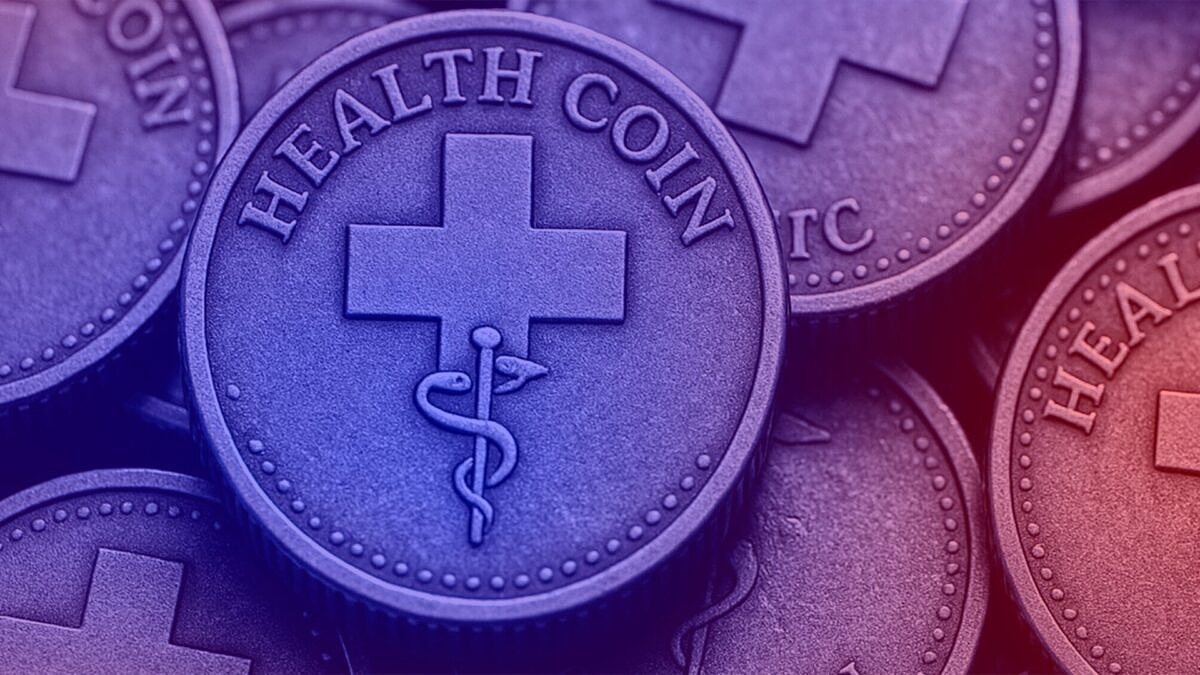Health tokens: How crypto is shaking up the healthcare market
A DMEXCO column by Thilo Kölzer, COO of DocCheck AG, on the disruptive potential of health tokens in the healthcare market.

Between blockchains & blood values – Can Bitcoin & Co. give the healthcare market a vitamin injection?
In recent months, it has been difficult even for those not interested in the topic not to hear or read about Bitcoin & Co. Bitcoin, the first and largest cryptocurrency, reached the next all-time high a few weeks ago and now has a market capitalization of around two trillion euros. Together with the two following cryptocoins in second and third place, this results in a market coverage of over 85 percent. There are now more than 10,000 cryptocoins, which share the remaining 15 percent.
“The market is currently developing rapidly but is still somewhat chaotic. Cryptos sometimes live from their narrative, meaning the story behind them – and that is precisely why they are very interesting for me from a marketing perspective. Because developing a narrative for an existing product or service is one of the marketing basics. And when such a narrative defines the product itself and brings it to life, that is the art of marketing communication. Many of these cryptos tell a story about their vision, purpose and provide insights into the “story behind”.
Cryptos are values and transactions that are secured by a decentralized, independent and cryptographic system (in the form of a blockchain). An obvious use of cryptos is the payment function, which makes it possible to purchase goods or services. In principle, this is the vision behind the cryptocurrency Bitcoin itself: that it can be used like money.
For the masses of other, thousands of cryptocoins however, it is important to be heard and attract attention in the “crypto ocean” in the first place – and a well-understood and communicated narrative is one of the key points to achieve this.
Telling good stories: The story behind health tokens and crypto coins
These following narratives are currently playing an important role:
- AI: Like almost everywhere else, artificial intelligence is of course omnipresent in the crypto sector. AI technologies can improve blockchain networks, revolutionize predictive analytics and further develop automated decision-making processes. Well-known coins in this narrative include Tao, Render and Aioz.
- Real world assets (RWA): This narrative is about tokenizing RWAs such as real estate in order to transfer property. Well-known coins in this narrative include Ondo, Pendle and Mantra.
- Gaming: A third narrative that is currently in demand is in-game economies. This involves the trading of digital game assets or reward systems. Well-known coins are Beam or Immutable for example.
These are just three examples of crypto stories. In general, it can be said that cryptocoins can be used wherever transactions of any kind take place.
And what about health?
In my opinion, health is a very suitable story, but is still not very widespread. Thousands of health-related transactions take place every day: Exchange of vital data and diagnostic readings, scans from imaging procedures of all kinds, transmission of doctor’s letters, findings, diagnoses and much more. Cryptocoins could help to securely store and share personal health data. I asked crypto educator and influencer Andreas Gappmaier (@kryptowelten_andi) to give me his take on “Health, Science & Crypto”:
“I find health tokens and DeSci (“Decentralized Science”) really exciting because they address so many problems in science. They make it much easier and fairer to fund research – for example, patients can directly support projects that are important to them. At the same time, they reward researchers for really good work, rather than for the number of publications or the best contacts. And best of all, knowledge is shared much faster and is accessible to everyone. This feels like a step in the right direction, away from old, rigid systems. This makes the health and research sector much more transparent, fairer and more efficient. As doctors and researchers no longer have to spend 50% of their time funding their research.”
I also find the aspect of decentralized science very interesting. This could for example mean, that a research project issues its own cryptocoin with the narrative of supporting the research project (e.g. “fight against disease XY”). Anyone who wants to support this narrative can buy this coin and thus directly support this research project. Sounds a bit like trading on the stock exchange – except that there are no intermediaries such as banks or other institutions in between (which is the core idea behind the term “decentralized”).
Health tokens – an opportunity for the digital healthcare of tomorrow?
Let’s take a look at reality: which health or science tokens already exist?
Medibloc Health Token
The largest health token is MediBloc, but it is only ranked 434th among cryptocoins by market capitalization (according to the ranking of the industry service CoinMarketCap) – and that is already quite far behind. MediBloc’s market capitalization is currently around 70 million dollars. What is the story behind MediBloc?
“MediBloc is creating a patient-centered ecosystem for health data that protects the privacy of individuals and maximize the reliability of health data.”
Sounds a bit like electronic patient records (ePA) – because this is also about the secure exchange of sensitive, personal health data.
Health Token SuperWalk
Another health coin is SuperWalk. The accompanying story reads:
“SuperWalk is a blockchain-based move to earn service that rewards movement. Coins can be earned by walking.”
Obviously a mixture of health promotion, prevention and gamification. After all, the market capitalization is around 45 million dollars.
SuperWalk would be a good use case for health insurances: exercise such as walking or running is rewarded with cryptocoins, which in turn can also be exchanged for real currencies or reduce the monthly fee.
Aimedis Health Token
A third example is Aimedis (AIMX). This is still a very small project with a market capitalization of just 200,000 dollars, but with an interesting vision: To create an eHealth platform based on the blockchain idea – a kind of medical metaverse. The components of this new healthcare ecosystem to be created will include digital patient records, video consultations, e-learning – and even the first virtual hospital chain. In principle, it is always about connecting patients with healthcare professionals in the broader sense. The transactions are processed with the help of the specially created cryptocurrency AIMX and are therefore decentralized without the intervention of a governmental actor.
Whether this will work remains to be seen, but the approach of tackling all these issues on a blockchain basis, visibly and transparently for all stakeholders, sounds almost revolutionary compared to electronic patient records & Co.
What is fascinating about cryptocoins is not only the narratives, but also the disruptive character they emanate.
In the case of Aimedis, it offers a great opportunity to rethink and fundamentally redesign such complex systems as a healthcare system – and that is a win in itself, even if an individual project should not succeed.





